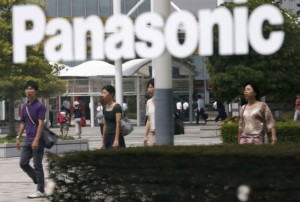 Japanese electronics giant Panasonic said Thursday it would give employees sent to China a wage premium to compensate for the country’s hazardous air pollution, in a possible first for an international company.
Japanese electronics giant Panasonic said Thursday it would give employees sent to China a wage premium to compensate for the country’s hazardous air pollution, in a possible first for an international company.
The move was part of a wider deal reached in Japan’s annual labour talks which saw major firms, including Panasonic and Toyota, agree to boost workers’ salaries for the first time in years, amid concerns about an economic slowdown after a sales tax rise next month.
A Panasonic spokesman confirmed the pollution-linked pay premium for its expatriate workers, but declined to give further details or say how many such workers it has in China, which has extensive trade and business links with Japan.
So-called hardship pay is not unusual for employees of foreign firms sent to work to China, but Panasonic is believed to be the first to announce a premium to compensate for polluted air.
A Panasonic document from the labour talks said: “As for the premium for expatriates to compensate for a different living environment, the company will have a special review for those sent to Chinese cities.”
On the weekend, a top Chinese environment official said that air quality was below national standards in almost all China’s major cities last year, after Premier Li Keqiang pledged to “declare war” on pollution.
Only three out of the 74 cities monitored by the government met a new air quality standard, said Wu Xiaoqing, a vice minister of environment protection, underscoring a problem that has set off alarm bells over health concerns.
The Panasonic document referenced so-called PM 2.5 small particles which easily penetrate the lungs and have been linked to hundreds of thousands of premature deaths.
The standard lists limits on a string of pollutants including sulphur dioxide, nitrogen dioxide and airborne particles.
Levels of PM 2.5 have repeatedly reached more than 400 micrograms per cubic metre, according to a count by the US embassy in Beijing, more than 16 times the World Health Organization’s (WHO) safety guideline of 25 micrograms.
Chinese cities are regularly cloaked in a smoggy haze, with many residents donning masks to avoid taking in the toxic air.
The public have been increasingly angered by the severe environmental consequences of the country’s rapid industrialisation, among them smog, land laden with heavy metals, and chemically contaminated waterways.
The country’s heavy and chemical industries, its reliance on coal as its main energy source, rapidly growing car emissions and widespread urban construction have all been blamed for helping exacerbate the problem.
Chinese authorities have repeatedly pledged action in recent months, but experts warn that implementation will be key.
The government plans to shut down 50,000 small coal-fired furnaces this year, clean up major coal-burning power plants, and remove six million high-emission vehicles from the roads, Li said recently.
Source-NDTV





